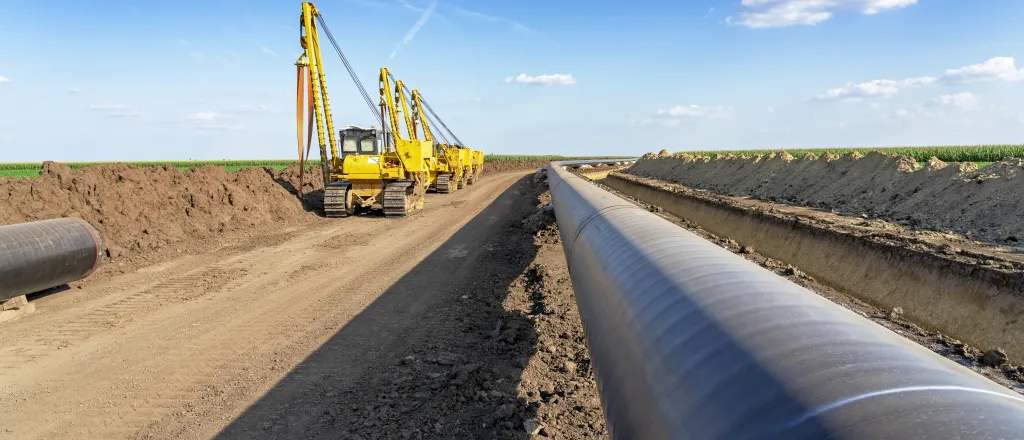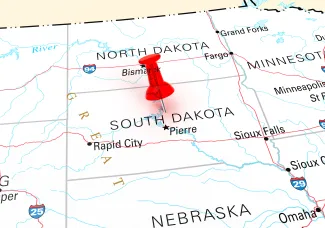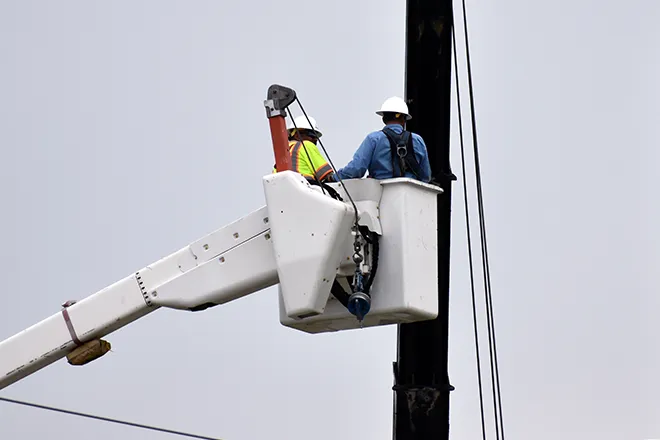
South Dakota regulators deny carbon pipeline permit again, but company vows to reapply
Summit Carbon Solutions’ pipeline route as proposed in its permit application is “not viable,” South Dakota regulators determined Tuesday in Pierre. The Public Utilities Commission voted 2-1 to deny the company’s application, but Summit immediately pledged to reapply with a “reduced scope.”
It was the second South Dakota denial for Summit, which has been seeking a permit to build a portion of its proposed $9 billion pipeline through South Dakota since 2022. The commission denied the company’s first application in 2023, after which the company modified its route and reapplied.
The pipeline would carry carbon dioxide emissions captured from ethanol plants in five states to an underground storage site in North Dakota, where a Summit official has acknowledged some carbon could also be used to extract oil from old wells. The project seeks to capitalize on a broader federal push to reduce greenhouse gas emissions and could qualify for federal tax credits tied to carbon sequestration.
Its path forward was complicated by the South Dakota Legislature’s passage of a carbon pipeline eminent domain ban, which was signed into law by Gov. Larry Rhoden in March. Eminent domain is a legal process that allows qualifying entities to acquire access to private land for projects in the public interest, with compensation for landowners determined by a court.
Summit had relied on that authority to survey land and secure access from property owners unwilling to sign voluntary easements.
A spokeswoman with the company vowed Tuesday in a prepared statement to refile an application for the project that “reflects a reduced scope and continued engagement with landowners and plant partners.”
Opposing landowners celebrate
Too many landowners at key points along the proposed route vowed to never sign an easement agreement for the project, rendering the application incomplete and ill prepared for the permitting process to continue, said Commissioner Kristie Fiegen during the meeting.
“Summit’s route is uncertain at this point,” Fiegen said. “We really don’t know the route. We don’t know the timeframes. We don’t know their plan.”
PUC staff said the permit could be denied because “substantive changes” will be needed to the application if the company can’t move forward with the route it has on file. Denying the application would then be “the cleanest path forward,” according to the staff’s filed recommendation.

Attorney Brian Jorde, representing landowners opposed to the project, said the application is impossible because “there’s nothing they can do to change these folks’ minds.” Seventy-nine South Dakota landowners declared they would never sign an easement, according to one of the commissioners.
“Is there another route?” Jorde said. “Yes, but not in this application.”
Property owners opposed to the pipeline applauded the commission’s decision. Ed Fischbach, a vocal critic of the project, said in a news release that the decision acknowledges “the company has run out of road to build” and frees landowners “to get on with their lives and businesses.”
But Canton Republican Rep. Karla Lems, who carried the successful eminent domain ban during the legislative session, said she has “a hard time believing” the project is over, especially if federal tax credits remain available.
The decision affirms that South Dakota is “open for business, but not for sale,” she said.
“If you have a great project and want to get it done in South Dakota, you should come in and do it the South Dakota way and people should be able to say yes or no to your project,” Lems said.
Summit officials ‘remain committed’ to state
The Public Utilities Commission instructed Summit earlier this month to present a plan to illustrate how the company can move forward – or not – under the new state law barring its use of eminent domain. At its previous meeting, the commission denied Summit’s request for a pause in permit proceedings.
Summit has permits in North Dakota, Minnesota and Iowa, but some of the permits are being challenged in court. Nebraska does not have a permitting process for the project. A bill to ban eminent domain for carbon dioxide pipelines is being considered in the Iowa statehouse.
Summit attorney Brett Koenecke opposed South Dakota regulators’ decision Tuesday, calling it “a prejudice” to the company pushed by opponents.
“You should ask yourselves why they’re fighting so hard to have this application denied and sent back,” Koenecke told commissioners. “I’d submit to you that the answer is likely they know it’s harder to restart.”
Commissioner Chris Nelson dissented from his colleagues Fiegen and Gary Hanson, arguing that Summit’s declaration that “they’re not going to challenge” the eminent domain ban, in addition to minor changes to the pipeline’s planned route, are enough for the project to move forward.
Summit filed paperwork with the commission this month stating that it would rather work with its current application and route than seek court orders or refer the ban to the voters, adding that “threatening legal action is counter-productive to attempting to do business in good faith in the state.”
In a prepared statement, the Summit spokeswoman said company officials are “disappointed” in the commission’s decision but “remain committed” to South Dakota and the project.
“Without it the ethanol industry, farmers and land values in the state will all suffer,” she said.

















